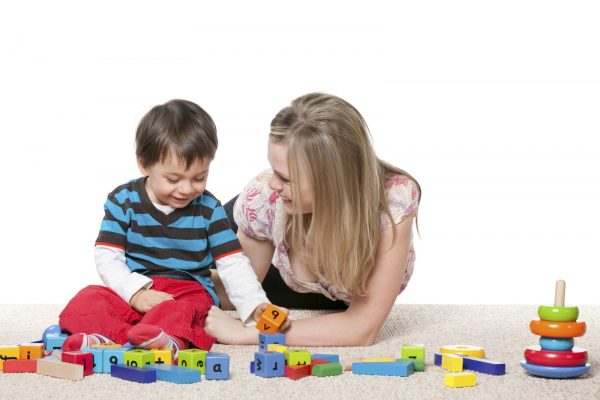Learning language skills is a major piece of your child’s developmental puzzle.
According to the American Speech-Language-Hearing Association (ASHA), as your child develops more language skills she is growing the ability to understand what words mean, create new words and figure out which words fit into certain situations. By using play activities to help your child’s language development along, you can turn learning into a fun-filled experience that is both interactive and educational.
Talking Through Play
By the time the average child reaches 12 months he can understand up to 50 words and say roughly three words, according to the child development experts at PBS Parents. Instead of just waiting for your infant or young toddler to get a grasp on language use, try a few basic games that encourage sound-making and speech comprehension. ASHA suggests talking to your young child as you go through your day. Whether you are stacking plastic blocks or pushing around finger paint, make language a primary factor in your child’s daily play. For example, when you are playing with blocks, describe your child’s actions, ask him questions and encourage him to use simple naming words to describe what he is doing. You can continue this play activity as your child grows, making your questions more complex and expecting your little learner to use a more sophisticated type of language such as multi-word sentences.
Imitation Games
When your child copies your actions she is learning by your example. As an infant or toddler your child can learn give-and-take language skills by playing simple imitation games, such as pat-a-cake or peek-a-boo. By the preschool years, when your child is ready to speak in full, multi-word sentences, you can encourage expanded language use by repeating what your child is saying back to her. For example, if your 3-year-old says, “Want toy,” parrot back, “Want toy? Can you tell me what toy you want to play with?” Continue the line of questioning, persuading her to get more specific, use a broad vocabulary and build longer sentences.
Pretend Play
Your preschooler or older child is developing the language skills to tell full stories, use an expanded vocabulary and engage in social group discussions. Play up these improving abilities with a dramatic activity that allows your child to stretch his imagination. Set up a pretend play scenario in a mock kitchen, puppet theater or using dress-up clothes. Urge your child to use his words, describing what he is doing, interacting with peers or siblings and making up his own tall tales.
Art Activities
If you believe that art activities can only help your child’s creativity or fine motor skills, think again. By talking through her work process or identifying colors, your child can use these play activities to build up her vocabulary . Whether your mini Monet is painting, drawing with crayons or using modeling clay, encourage her to use her words as she creates. Ask her open-ended questions such as, “What can you tell me about the colors that you are using for your painting?” or, “Why did you choose to draw those shapes?” to further her language development as she plays with the artistic processes.

